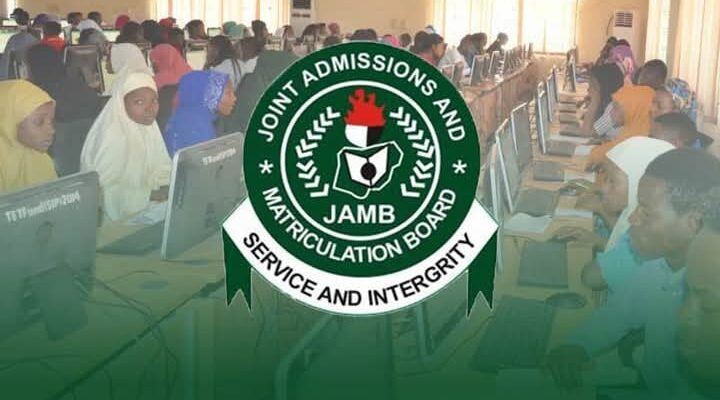
JAMB of many woes and the crisis of a garrison state
By Adewale Adeoye
True. Ahmed did not eat for days. His mother tried in vain to console him. He cried day and night. Her mother cried too. His future has been trampled underfoot by some tyrants who claim to be gods over the fate of the education of Nigerian children.
He scored 150 in the Joint Matriculation examinations. Days after the examination, he had checked again following public outcry, his mark had been reduced to 120. JAMB killed the future of Opesusi Faith. JAMB brought her bitter news. Faith brought to her family the bitterest news. At Odogunyan, Faith 19, killed herself with poison. She had scored 190 and could not understand the reason having read day and night. You can see how the gross inefficiency of public and private institutions in Nigeria has turned lofty dreams of young Nigerians into a cemetery.
Kareem did not seat for the Joint Admission and Matriculation Board, JAMB examination. He got to the centre late. When the result came out, he scored 350. Ahmed sat for the examination in Bauchi. He told his mother, Hajia Aminat that, from the taste of the examinations, he would perform excellently. He scored 140. This was his third attempt at entering a University. 140 was his poorest. The last time he scored 230, though not enough to go in for law. But this time, his father had mocked him that he should rather be a ‘rewire.’ That was the arrow that hit him hard in his veins, his artery and even in his eyes. He had wanted to study law and was desperate to wait as long as JAMB, the bouncer, fierce gate keeper, would permit him. For Akpan in Calabar, he was one of the best students in his school, but JAMB scattered his pride. Score was 120. Children have tender hearts, always in awe, a state of trembling and fear. Any shock can be devastating. Many candidates are at half mast, mourning and gnashing their teeth. The poor scores for brilliant candidates sow the seed of eternal anxiety in the sub-consciousness of many. One of them told me ‘I don’t think I can ever make it’, victim of many of Nigerian repressive and inhuman policies said. Approximately 2, 30,900 registered for JAMB, about 1, 955,69 sat for the examinations while 71, 705 were absent. Why were those people absent? They could not use computers of for security reasons? JAMB should answer that critical question. Over 1.5m scored below 200 and about 420,415 scored above 200. Only 12, 4014 scored above 300 while 4, 756 scored above 320. But from the hitches, those who scored above 300 might have actually scored less than 150 in the real sense and those with less than 200 may have scored over 300.
On social media, one candidate named ‘Wealth’ reported a lady who checked her result in the morning, got 155 only to be increased to 299 in the afternoon. A biology teacher with 18 years of teaching experience, John Felix Obuighken scored 37 in biology even though he has a degree in Biology. His intention is to be a medical doctor. A candidate said he sat for the examination in Onitsha. He scored 200 in the morning and when he checked the results again the second day, the ‘ghost’ examiner had added 50 extra. The chaos associated with JAMB is not new. What is real is that Nigerians are becoming more audacious to speak out. Even grimier is the reality that it seems nothing works in Nigeria except corruption, favouritism and a state which primacy function is to punish the citizens.
Understanding the Problem
Ability of Nigerians to effectively, technically manage public institutions has declined over the years. Patriotism has ebbed. Individual survival is the motivating factor especially when the leaders themselves think only of and for themselves and their children.
JAMB reflects the deficit of good leadership and the pitfalls of corruption and gross maladministration associated with public and even private institutions in Nigeria to the extent that when Government companies are privatised, in many cases, self-serving crooks are the first beneficiaries. It is an historic problem that cannot be disassociated from poor and visionless drivers of the political-economy. Nigeria is saturated with administrators noted for contempt and hate for the people they are expected to govern. JAMB has tried to defend the rot in the most shameful manner without any empathy for candidates whose psychology and mental composure have been bruised. JAMB is the true window that introduces a child into the real academic world. Once that window diminishes hope, despair for the future sets in.
In all, the rot in the Nigerian education sector has only been manifested again through savage administrative pedigree of JAMB.
Many have argued that this might be the first time JAMB would commit such a horrendous, even murderous crime, the truth is that the Nigerian education sector for a long time has been irresponsible, a cesspool of maggots. JAMB is not excluded, except it is hyped by a section of the media that focuses on its touted profit skybound, as if the board should be about profit instead of being primarily for getting the best out of students at the least cost to the poor children.
A lot of things are wrong with JAMB. I visited one of the centres on a Friday in Lagos. The time of the examination was fixed for 3pm. We got there one hour earlier only to discover they had started in the midst of scorching sunshine. Worse still, chairs were set for parents to wait at the cost of N300 per hour, ran by a cartel. There was no consideration for candidates living with disabilities. Many students, girls and boys, Yes, were stripped of their belts on the strength that they might have hidden prepared answers inside holes in their belts. The candidates had to hold their sacking trousers with both hands to prevent public stare at their torso. Girls who wore indecent dresses in the theocratic imagination of a warped sense of discipline by the JAMB invigilators were sent back, forcing them to scramble for dresses from textile traders in the vicinity to the shame of this country. Some derided them, gleefully while street urchins made a dance sketch of the drama.
At one centre also in Lagos, some 200 belts were seized. They were never returned meaning that the officials would sell them and make a profit. Across the country, no fewer than 500,000 belts may have been seized apart from the trauma the students were subjected to. Nigeria is full of villains, callous heathens who go to Churches and Mosques but daily, inflict pains, anguish and misery on fellow human beings claiming to be enforcing discipline. They do so with arrogance. They take comfort in bullying. There are many educated hooligans running sensitive institutions in Nigeria.
What is to be done?
The Nigerian examination board and the education sector itself, needs radical restructuring. I doubt if the present ruling class has the will. For instance, it is unfortunate that while the National Assembly was anxious and desperate to have sessions on Akpoti Natashi vs Senate President Godswill Akpabio, it did not consider it necessary to address the crisis of leadership in JAMB which directly affects the family of almost all Nigerians.
The Political and Economic context of JAMB
However, Nigerians should not forget that JAMB was not a product of a parliamentary Act with decisions of its foundation taken collectively by Nigerian academic experts. It was created by military fiat in 1978 with more of parochial political than administrative motive. The pioneer registrar was Saidu Angulu who served until 1986. Prior JAMB, each University conducted its own examination. Candidates could apply to all the existing University at the same time. JAMB came from the power play to ensure the over centralisation of power-politics now extended to the spheres of education. In the power game, the control of education apparatus is key to the control and manipulation of the human mind and its ability shape advancement in science, art and culture through the images of primeval managers. JAMB determines who should go to the University and who should not.
It is similar to the gradual take-over of University policy administration in Nigeria by the National Universities Commission, (NUC) which was, before, merely in the cabinet office of the Prime Minister. In a plural society, University administration in a particular environment should be linked to ancestral civilisation and culture. The Ahmadu Bello University established in Zarai was propelled by a certain indigenous values of the North, so also were the University of Nigeria, Nsukka and the then University of Ife, which was expected to provide the intellectual brain box for Eastern and Western Regional Development, based on indigenous and time tested values.
But the NUC, established in 1962 as an advisory agency in the cabinet office of the Prime Minister Tafawa Balewa, took that away, further strengthened by the creation of JAMB in later years completed with the arbitrary taking over of regional Universities by the Federal Government in 1976, by force of arms.
It was in 1974, again under the Military, that the NUC became a statutory body. Its first Executive Secretary was Prof Jubril Aminu.The first Chairman was Emir of Yauri, Alhaji Tukur. NUC was only empowered in 1966 to coordinated activities of Nigerian Universities by the military Government to the detriment of the regional creative energies. In 1974, it became a statutory body after which the Secretary was given Executive powers. Today, Nigerian Universitys’ academic policy direction, in a diverse and multicultural society, is driven by the NUC. It determines how many courses and which courses Universities must offer. It is no surprise that no University, for instance, offers Zuru, Angas, Ogoni or Ijaw language as courses. There are 283 accredited Universities in Nigeria, 69 are owned by the Federal Government, and they are the oldest, 66 owned by states and 148 Private Universities. There are 152 accredited Polytechnics, 40 of them owned by the Federal Government and 49 owned by states. 63 are owned by private individuals. All are subject to the dictates of the NUC which limits the intellectual and research horizon and also limits the number of students Universities can admit per course. This limits the potentials of Nigerian Universities, stifles their creative energies and halts their aspirations. For your information, the then University of Ife wanted to embark on Atomic Energy research in the early 1970s. The NUC said no. One of the Vice Chancellors told me Ife would have developed nuclear energy and even atomic bomb, if given the chance.
UNN suffered a series of NUC and Federal persecution because of its civil war role. Odumegwu Ojukwu actually declared Biafra at the Prince Alexandra Hall which was bombed by Nigeria during the war. Subsequent VCs left the rickety hall which housed Philosphy Department for many decades without any attempt to rebuild.
This reflects the garrison and anti-democratic nature of Nigerian historic emergence and by far responsible for the stunted growth in the education sector.
Learning curves from other countries
Let us face it, in the US, the Federal Government plays a limited role in University admission. For instance, there are multiple examination opportunities for students. There are more than one boards that conduct admission into Universities. There is the Scholastic Aptitude Test, (SAT) taken by junior and senior college students applying to Universities. There is also the American College Testing, (ACT). This gives each student broader opportunities. In the US, students can apply to more than 80 Universities at a time, expanding the frontiers of choices. In Nigeria, we are limited to first and second choices.
Yet, in Nigeria, the West African Examination Council, (WAEC) is the ultimate for secondary school students. An excellent student from JSS1 who has challenges while sitting for WAEC automatically becomes redundant if the student fails WAEC. In the US, the assessment from the first year to the last year is what matters. It is the ultimate test which means students only need to submit the transcript in order to enter any University. In the US, the student is also required to collect letters of credence from the class teachers, one from Science, Art and Humanity which shows the importance of character in University placement.
In Nigeria, many brilliant students who could not pass JAMB have had their future shot down and those who could not pass WAEC lose their grandeur and destiny, sometimes for ever, yet we are calling for patriotism from the younger generation when all we do is to destroy their future. The wobbled system has led to the near collapse of University education. There are more than eight students in hostels in many Universities, students off campus have to be exposed to excruciating threats from an increasingly violent society as they struggle on their own for water, electricity, food and livelihood. The primary and secondary education is not immune from internal contradictions.
For most teachers and school administrators, the propeller is greed and money. Impacting knowledge is secondary. This is why many secondary schools no longer close for the day by 4pm, all because of compulsory ‘extra-lessons’ at a very painful cost. Some primary schools do the same, leaving small children to return home from school especially in places like Lagos sometimes 7pm. Corruption is also entrenched in schools. A mother informed me how teachers in her school demanded for ‘half a crate of eggs’ per student for ‘experiment’. The eggs from over 200 students were never returned back.
Nigeria needs to overhaul her educational system. But this is impossible without first overhauling the corrupt and inept political leadership.
The current system is cruel. It destroys the potentials of our children and puts a ceiling on their life ambitions. Urgently, there is the need for alternative to JAMB. There should also be Regional Examination bodies apart from JAMB while a new policy should take into consideration the prospects of students being able to apply to at the same time to many Universities instead of the limits imposed by JAMB. The NUC should be scrapped or retain the status of its advisory role. Today, millions of children are frustrated and castrated by the present system which kills and destroys hope of tomorrow’s leaders. Those who blame the students should look at the mirror. The younger generation is nothing but a product of the operating environment and the architect of that environment is the character and form exhibited by those in Government. The Education system cannot be immune from the rot, and the corruption in the civil service, in customs, in the National Assembly and in public service. No country runs in this way successfully for too long. Something will, and must happen.
To fight this shame decisively, the starting point is a restructured Nigeria.
Adeoye is a multi-award winning Journalist who lives in Western Nigeria.
Just-In: JAMB Registrar, Oloyede in tears, announces rescheduled UTME
BREAKING: JAMB admits to errors in 2025 UTME
FG rejects US assessment of Nigerian airports as unsafe
Share your story or advertise with us: Whatsapp: +2348033202396 Email: sentinelnewsng@gmail.com










